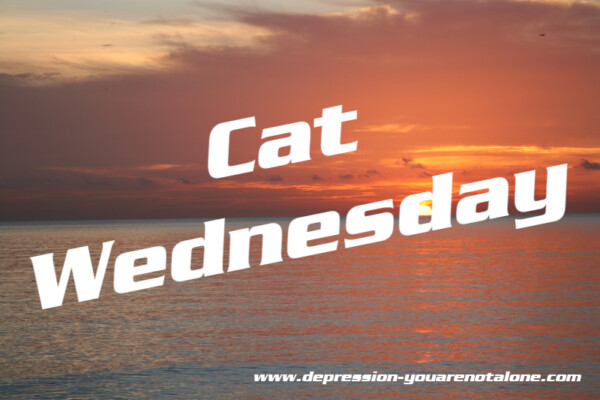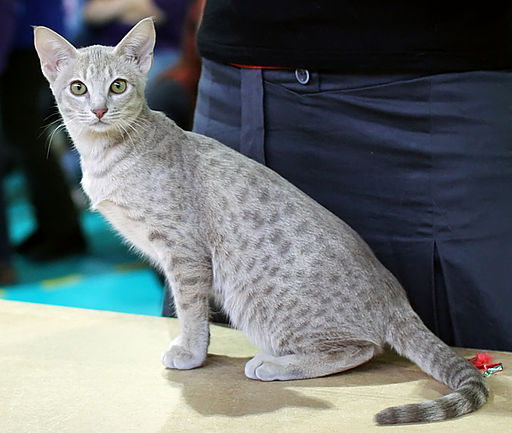Cat Wednesday 2023-08-09
Having cats as pets can be a great source of companionship and comfort. Not only do cats provide unconditional love and affection, but they can also help improve your mental health. Studies have shown that having cats as pets can reduce stress levels, lower blood pressure, and even increase feelings of happiness and well-being. Cats can also help us feel more connected to nature, as they are an important part of the natural world. In addition to providing physical and mental health benefits, cats can also bring joy into our lives with their playful personalities and amusing antics. By providing us with companionship, comfort, entertainment, and relaxation, having cats as pets is an excellent way to enhance our lives and improve our mental health. – Editorial Team
.
Ocicat
Editorial Team
Heikki Siltala – catza.net, CC BY 3.0, via Wikimedia Commons
The Ocicat is a distinctive and captivating domestic cat breed known for its striking resemblance to the wild ocelot, a small wild cat found in the Americas. The breed was developed through careful breeding programs that involved several different cat breeds, creating a unique appearance that mimics the look of a wild cat while maintaining the temperament of a domestic companion.
Origin and History: The Ocicat breed was created by accident in the early 1960s when a breeder named Virginia Daly attempted to produce Siamese kittens. One of her Siamese cats mated with a male Abyssinian, resulting in a litter that included a spotted kitten with a stunning coat pattern. This unexpected kitten, named “Tonga,” became the foundation of the Ocicat breed.
Recognizing the potential of this new breed, Daly worked alongside other breeders to further develop the Ocicat by crossing Abyssinians, Siamese, and American Shorthairs. The breed’s name, “Ocicat,” is a combination of “ocelot” and “cat,” reflecting its wild appearance.
Appearance: The Ocicat’s appearance is its most distinctive feature. While it has the appearance of a wild cat, it’s important to note that the Ocicat is a fully domesticated breed. Here are the key aspects of its appearance:
- Coat: The Ocicat’s coat is short, sleek, and dense. It has a distinctive spotted or “ocelike” pattern that closely resembles the markings of the ocelot. The spots can range in size and are evenly distributed across the body.
- Color Varieties: Ocicats come in various colors, including tawny, chocolate, cinnamon, blue, lavender, fawn, and silver. The coat color is accompanied by darker spots that contrast against the background color.
- Build: The Ocicat has a muscular and athletic build, giving it a strong and agile appearance. The body is well-proportioned, with a medium to large size. It has a slightly elongated neck and a long, tapering tail.
- Head: The head of an Ocicat is wedge-shaped with prominent cheekbones. The ears are large, alert, and slightly tilted forward. The eyes are almond-shaped and large, providing an alert and expressive look.
Temperament: The Ocicat is known for its friendly, outgoing, and social personality. These cats are intelligent and curious, often showing a keen interest in their surroundings. They tend to get along well with other pets and enjoy interacting with their human companions. Ocicats are known for their dog-like behavior, such as fetching toys and following their owners around the house.
They are playful and enjoy interactive toys and games. Their high intelligence makes them easily trainable, and some Ocicats can even learn tricks or commands. This breed thrives on human interaction and can become quite attached to their owners.
Care and Maintenance: Caring for an Ocicat is relatively straightforward:
- Grooming: Their short coat requires minimal grooming. Occasional brushing helps remove loose fur and keeps the coat healthy.
- Play and Exercise: Provide plenty of playtime and interactive toys to satisfy their need for mental and physical stimulation.
- Health: Ocicats are generally healthy cats, but like all breeds, they can be prone to certain genetic health issues. Regular veterinary check-ups are essential to catch any potential problems early.
- Diet: Feed them a balanced and appropriate diet to maintain their overall health and weight.
- Litter Box: Keep their litter box clean and provide a suitable place for them to eliminate.
In summary, the Ocicat is a captivating and unique breed that combines the appearance of a wild ocelot with the temperament of a loving and interactive domestic companion. Their striking appearance, playful personality, and social nature make them a popular choice among cat lovers looking for a one-of-a-kind feline friend.


